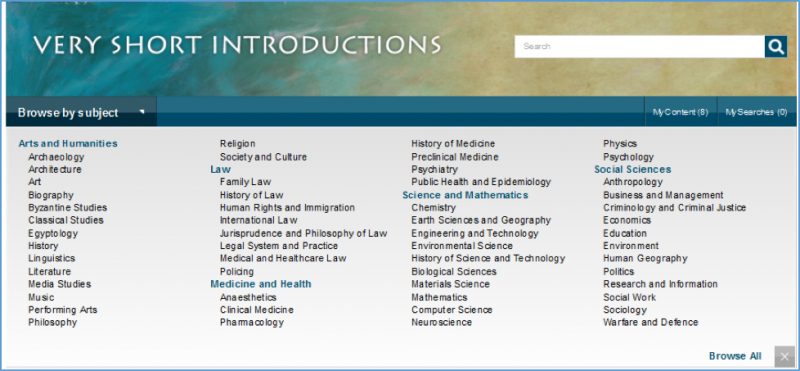A bridge from reference materials to higher academic works
Students typically learn during a library workshop that an encyclopedia is often the best place to begin research. Encyclopedias provide a broad overview of a topic and, as tertiary sources, can also direct students to valuable secondary and primary sources. Students might start with a general encyclopedia, but they are more likely to discover a specialized one as the publication of specialized encyclopedias has accelerated making it more likely than not that there is an encyclopedia entry on their topic. Reference and instruction librarians typically teach students how to access and use Gale Virtual Reference Library, the biggest and most up-to-date encyclopedia database the library offers.
Recognizing their value, the Library continues to look for these “getting started” types of resources. We recently began subscribing to the full collection of the book series Very Short Introductions — which includes over 460 titles — published by Oxford University Press. As the name implies, these books, which are written by experts for a wide audience, provide concise introductions to a variety of topics including disciplines, issues, themes, biographies and literature.

Unlike encyclopedias that provide entries on topics within their thematic scope, Very Short Introductions are more like mini-textbooks which, because of their size, can easily be read cover to cover. Professors frequently assign the entire “short” to provide the content students need to have meaningful discussions about a topic. For example, if you are teaching a class on a conflict in the Middle East but don’t have the confidence your students have the necessary background knowledge, consider assigning The Palestinian-Israeli Conflict: A Very Short Introduction, Geopolitics: A Very Short Introduction, or Peace: A Very Short Introduction. If you need help explaining to your students why we read Plato, consider assigning Ancient Philosophy: A Very Short Introduction. If you would like your students to understand why Algebra is a pillar of mathematics, consider assigning Algebra: A Very Short Introduction.
To find a “short” that is right for you, go to the library’s homepage and click on the link to search for databases by title. Select “V” and once you click through to the Very Short Introductions interface you have three search options: browse titles by subject, browse all titles (of course the least efficient option unless you are really interested in learning about the breadth of topics that are covered) or use the search box to do a keyword search.
A recommended approach is to start by browsing by subject and then conduct a keyword search since the subject classifications may not match your expectations or have a narrow enough focus. For example, the only title under criminal justice as a subject is Criminal Justice: A Very Short Introduction. However, if you do a keyword search of “criminal justice” you will discover 219 chapters in a variety of titles. If you are interested in finding Forensic Science: A Very Short Introduction, you would have had to search under the subject “policing”. However, if you do a keyword search of “forensic science,” you would find 18 chapters in a variety of titles that address the topic.
Once you select a “short,” a variety of options appear including a table of contents, the ability to access the book by chapter and quick reference tools providing instant access to key concepts or people. Take notice that the hyperlinks in the search results will bring you to the place in the text your search terms appear. Also, like most library databases, the interface contains integrated tools that allow you to easily share, print and email selected content.
Keep in mind that these are ebooks that allow 3 users to simultaneously access them through an internet connection. If you prefer print, you can print a chapter of an ebook at a time, or check the library catalog because we also have a number of titles in print. As stated by one professor, “When I want to learn more about a topic, I start by looking for a Very Short Introduction”. We hope you consider doing the same.
Maureen Richards
—